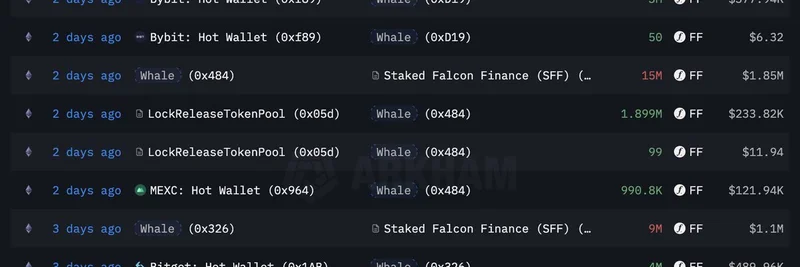In the fast-paced world of cryptocurrency, big players—often called "whales" because of their massive holdings—can make waves that ripple through the entire market. Recently, on-chain analytics firm Lookonchain spotlighted some intriguing activity around $FF, the native token of Falcon Finance. Over just eight days, five whale wallets pulled out a whopping 111 million $FF tokens, worth about $14.92 million, from popular exchanges like MEXC, Bitget, KuCoin, Binance, Bybit, and HTX. And they didn't just hold onto them—they staked every last one.
For those new to the scene, staking is like putting your tokens to work. You lock them up in a protocol to help secure the network or provide liquidity, and in return, you earn rewards—kind of like interest on a savings account, but with blockchain flair. Falcon Finance, a DeFi (decentralized finance) project focused on collateralization and yield generation, uses $FF for governance, staking perks, and more. Their platform has already powered over $2 billion in USDf (their stablecoin) circulation, making it a notable player in the space. Check out their official site for the full scoop: Falcon Finance.
This accumulation isn't random. Whales often move like this when they sniff out undervalued opportunities or upcoming catalysts. With $FF's price hovering around $0.13 (as per CoinMarketCap), this could be a bet on future growth. The token's total supply is 10 billion, with a market cap around $300 million, leaving plenty of room for upside if adoption ramps up.
Why the Staking Spree Matters
Staking all that $FF straight away shows conviction. These aren't short-term flips; they're long-haul positions. In DeFi, staking boosts liquidity and rewards participants, which can create a positive feedback loop: more staking leads to higher yields, attracting even more users. For meme token enthusiasts, this mirrors the hype cycles we see in viral coins, where early whale buys can ignite FOMO (fear of missing out) among retail investors.
Lookonchain shared the specific wallet addresses involved:
- 0xD19AEe012Ff77b866f78756467036db10a87b73E
- 0x484F6D38f80fA7679824e90E594b011BC4CfC68F
- 0x32642359C417213f383eAc9Ec5715F20AC6E709b
- 0xf68CEa3E1655DbBc41e8d804444F9E355Fbebf89
- 0xDda60B5b5E4c40A2D9Fc301de43f4AF93dCd3EaD
You can verify these on explorers like Etherscan to see the transactions in real-time. It's transparent, thanks to blockchain's public ledger.
Falcon Finance: Beyond the Hype
Falcon Finance isn't your typical meme token—it's built for utility. Launched recently with tokenomics that include community rewards and governance, $FF holders can vote on protocol decisions and earn from staking pools. Their recent Season 2 updates boosted rewards for "Miles" (their loyalty points), which could be fueling this interest. If you're into meme tokens, think of $FF as a hybrid: the viral potential of memes meets the solid fundamentals of DeFi.
Replies to the tweet echo the excitement. One user noted, "Whales know something we don't," while another called for HODLing (holding on for dear life). Even Falcon Finance's official account chimed in with a celebratory GIF, hinting at more to come.
What This Means for You
If you're a blockchain practitioner or meme token hunter, keep $FF on your radar. Whale activity like this often precedes price pumps or major announcements. But remember, crypto is volatile—do your own research (DYOR) before diving in. Track live prices on CoinGecko or join the conversation on X (formerly Twitter) via @FalconStable.
As the meme token landscape evolves, stories like this remind us why on-chain data is gold. Stay tuned to Meme Insider for more insights into the wild world of crypto accumulations and beyond.


